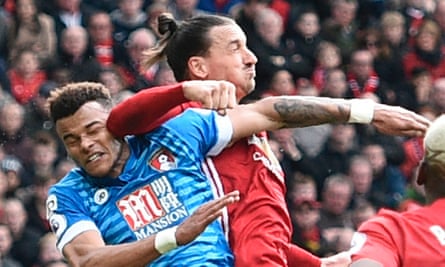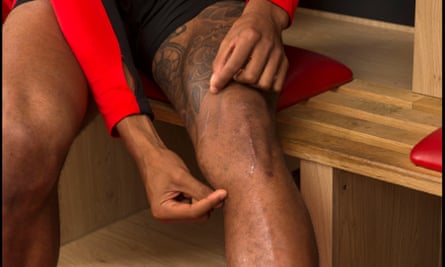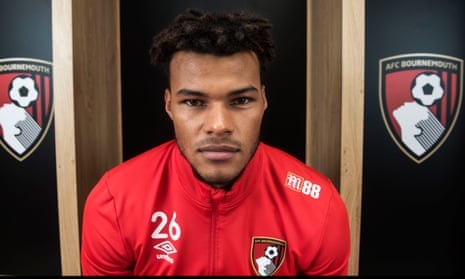Tyrone Mings is casting his mind back to that notorious flashpoint with Zlatan Ibrahimovic last season and considering whether he thinks the public perception of him has changed. “Probably, because I’d always been seen as sort of the Mother Teresa of football,” Mings says, breaking into laughter. “Everybody had such a charitable perception of me through things that I’d done to not really aim to give myself that tag. So as soon as that happened, I was given so many other labels, mainly from Man United fans via social media, but also via the pundits who were on Sky Sports at the time. I don’t think their comments helped.”
Mings, to be clear, is not moaning or seeking sympathy – that is not his style. An affable and gregarious character, the Bournemouth defender is full of positive energy and walks into the home dressing room for this interview in a way that betrays no sign of the news he is about to share concerning an injury blow. A meeting with a back specialist the day before saw him diagnosed with a potentially serious problem, ruling him out for a couple of months, just when he had hoped to kick on after signing a new four-year contract. “What can you do?” Mings says, shrugging his shoulders.
He is frustrated and bitterly disappointed, and conveyed that to Eddie Howe, Bournemouth’s manager, as he travelled back from London on Wednesday evening, yet Mings has also learned to keep this sort of setback in perspective. One of the subjects he talks about at length is the importance of “not pinning all my happiness on football” – a shift in mindset that is framed around the bitter experience of fighting his way back from the horrendous knee injury he suffered in August 2015, when he snapped the cruciate and medial ligaments in his left knee only six minutes into his first appearance for Bournemouth. Mings was still at the stadium, fearing the worst and waiting for a knee brace to be fitted, when he posted on Twitter: ‘If Carlsberg did debuts, it definitely wouldn’t go like this.’
Self-deprecation comes easily to Mings, who played non-league football and worked as a barman and a mortgage adviser before joining Bournemouth via Ipswich Town. A smile is never far from his face, even when reflecting on the backlash he received on social media in the wake of the Ibrahimovic incident. It turns out that KTM Design, the interior architecture practice he set up in Bournemouth with an old school friend from Chippenham, picked up a whole new client base that day. “Our social media page got inundated,” says Mings, shaking his head with a wry grin. “Hate-mail, not business inquiries.”
For anyone who has not seen what happened at Old Trafford on that March afternoon, Mings was accused of stamping on Ibrahimovic’s head – “a cowardly act,” said Gary Neville on Sky – while the United striker was prone. Ibrahimovic responded by elbowing Mings in the side of the face moments later. Both were retrospectively banned: five matches for Mings and three for Ibrahimovic.
“I didn’t recognise up until half-time that it was even a big deal,” Mings says. “Because I hadn’t meant to do it, I didn’t feel like it would be a talking point. But I realised when [José] Mourinho came over when we were coming out for the start of the second half and started giving me some abuse, saying: ‘You think you’re clever. You’re going to get an eight-match ban.’

“I just brushed it off, but then the referee said something to me as the second half started, saying: ‘It will probably get reviewed.’ I said: ‘What will get reviewed?’ He said: ‘The stamp on his head.’ I was thinking: ‘I don’t need you to tell me that just as we’re about to start the second half.’ And then when I got into the dressing room after the game, someone checked their phone and told me just how big the coverage of the incident was.”
Up until that trip to United, Mings was seen as football’s good Samaritan. He became national news a few months after joining Ipswich, when he offered his complimentary tickets to a fan who had said on social media he could not afford to go to a game. Then a story emerged that Mings had spent Christmas Day feeding the homeless in Suffolk. Next was the tale about buying replacement Ipswich shirts for the supporters who were left frustrated when Mings changed his squad number. New to the world of professional football, Mings wondered what all the fuss was about when the media focused on his acts of kindness.
At Old Trafford the spotlight shone on him for other reasons. Mings became public enemy No1 in the eyes of United supporters and he did not need to read the chief executive Ed Woodward’s quotes this week to discover that #mufc was the most used hashtag in global sport. “If ever there is going to be an event like that [with Ibrahimovic], you probably don’t want it at the team with the biggest fanbase in the Premier League,” Mings says, chuckling.
“My recent picture on Instagram before that game was a photo of an office design that we’d done at KTM. I think before the game it had about 13 comments on it. By the time I’d checked it again, at 7pm on that Saturday, it had about 2,500. Every inbox was full. I had people from China with Man United badges as their Facebook picture trying to call me on Facebook. I still get it to this day. My Facebook inbox of message requests is full, the same on Instagram. Pretty much every time I tweet something football-related, something to do with a stamp is said.”
The abuse and constant stream of opinions on social media did not bother Mings in the slightest but other things did. It was important to him, for example, that Howe believed there was no intent on his part, and he will always be grateful to the manager and the club for their “unwavering support” while he protested his innocence. He nods when it is put to him that Danny Murphy, speaking on Match of the Day, said the only person who truly knows whether he intended to hurt Ibrahimovic is Mings himself.
“It was an accident,” he says. “The fact that I jumped, slightly colliding with Rooney in the air and I was looking at the ball at the time, there’s no way I could have meant to stand on his head. And I would hate for anyone to think otherwise, that I would intentionally try to stamp on someone’s head when they’re lying on the floor. So the ban was really disappointing because of why it came about and the fact I’d just had a run in the team. I was finding my feet and I think I played well in that game at United but that was my last match of the season.”
Restless at the end of that campaign, Mings returned to action 48 hours after the final game and in the most unlikely of surroundings. Sat at home on a Tuesday night with Omar Sowunmi, his friend who plays for Yeovil, Mings posted on Twitter: ‘I wanna go kick some ball tonight.’ A Bournemouth supporter responded: ‘Littledown, 8.30.’ To the amazement of those taking part, Mings turned up with Sowunmi and played seven-a-side for an hour. “I didn’t know that when I got there 10 out of 12 people would have Bournemouth shirts on,” Mings says, laughing. “It was a little bit naive probably but there was no harm done.”
With Mings, who has been restricted to only 14 appearances for Bournemouth, it is easy to understand his desperation to play. He came into the professional game late and then lost 12 months with that awful knee injury. The 24-year-old still remembers waking up from the first of his three operations, looking down at the staples that had to be used to hold the skin together because his knee was so inflamed and feeling devastated. “My dad was with me when they did the grand unveiling,” Mings says, smiling at his choice of words. “The surgeon explained what had happened, they cut the bandage off to change the dressing and it was one hell of a state. How it was feeling and how it looked – I couldn’t fathom in my head the process that you go through to get that back to a normal knee and for me to be playing again.”
That journey was exhausting, especially mentally. Mings admits he “fell into such a bad place in the first six months” as he mulled everything over. He thought about all the focus that had been on him as the club-record signing, worried about Bournemouth being relegated and his Premier League dream disappearing, and even started to work out how many years he had left to play the game. Lonely and low, he sought help from a psychologist. “It was only really when I started working with him so intensely that, mentally, I changed my attitude towards football, my injury and my whole outlook on life.”
One of their key breakthroughs was redefining happiness. Mings came to realise how dangerous it was to hang everything on his football career and instead saw a need to “find some relevance in another way”. He started to spend more time with his family, in particular his three sisters, of whom he had seen little since moving to Ipswich in 2012, and also threw himself into his interior design business, which is two years old next month and going along nicely.
Even now Mings continues to find ways to stimulate his mind. He is developing an app that will allow people to create, organise and play football tournaments in their local area – “I can’t say too much about that because I don’t want people to nick my idea!” he says, laughing – and he plans to open his own football academy in his native south-west soon.

The end result is that life feels much more balanced. “If you make one thing your life and soul – as much as football is my career and main focus – then it turns into a very mentally unstable place to be,” Mings says. “Now, if anything goes wrong in football, whether it be injuries or team selection, I’ve got four or five other things that I can lean on. And as much as I’m disappointed with a football setback, and very competitive and I show that to the manager at times when I probably shouldn’t, and I always want to play, when I look at the bigger picture, I realise that these feelings are – it’s not the end of the world. And if everything was taken away from me, I feel I could still find happiness in other areas of my life, which is the point I’ve always wanted to get to.”
Mings knows there are always areas where he can improve. Without any prompting, he brings up the fact that he made an error of judgment towards the end of last season, when he filmed himself on a night out in Dublin, wearing a Gary Barlow mask and generally looking like he was enjoying himself a bit too much. “Clearly it wasn’t the right thing to do and I won’t be doing it again any time soon,” he says.
At the other end of the spectrum, the sort of good deeds that prompted him to mention that Mother Teresa moniker at the start still go on, although Mings has no desire to shout about them and, because of his heightened profile these days, believes “it’s definitely harder to prove the sincerity of doing any of those things now”.
For the moment he is more interested in winning his latest fitness battle. “I’ve got two discs at the bottom of the back that are quite badly damaged, that obviously happened over a period of time, and there’s inflammation on one of the vertebrae as well, which has come from the angle of my pelvis and spine,” Mings says. “It’s disappointing and not what I was expecting because I felt like everything was going in the right direction. But it’s also nothing more than I’ve dealt with before.”

Comments (…)
Sign in or create your Guardian account to join the discussion